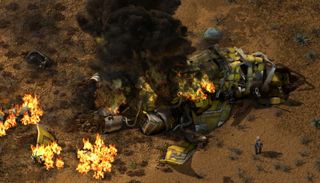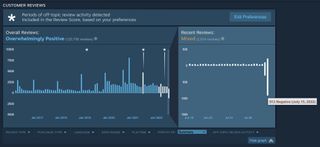Factorio studio angers Russian gamers by increasing regional price from $9 to $174
It looks like a mistake, but some Russian gamers took the price hike as a political statement.

Factorio developer Wube Software is facing a fierce backlash from Russian gamers after suddenly and sharply increasing the price of the game on Steam in Russia. The price hike resulted in a flood of hundreds of negative user reviews, and while the overall rating remains "overwhelmingly positive," the current rating is "mixed," with just over half of the user reviews posted over the past 30 days being positive.
As shown by SteamDB, the price of Factorio in Russia had held steady at ₽520 ($9) since Factorio's launch in 2020. On July 14, however, it shot up to ₽10,000—more than $174. That's a hell of a price for an indie game on Steam in any country, and it came without any word from the developer about a reason for the increase, or even an acknowledgement that it had happened.
Predictably, that led to confusion. Some followers assumed it was a mistake—that someone at Wube had mashed the "0" button one too many times while attempting to increase the price to a far more reasonable ₽1,000. Others, however, took it as a sign that the studio was making a statement about Russia's invasion of Ukraine.
The customer review graph tells the tale:

"Yesterday they changed price from 500 rub ~9 usd to 10000 rub ~ 170 usd. And didn't give any reason (okay we all understand this is because of Ukraine-Russian conflict)," one Steam reviewer wrote. "I don't understand why regular players have to overpay because of the political stance of the developers. they literally say: Hey, are you Russian? then you will pay 20 times more for our product. I think it's called racism."
"Bringing politics into the game world is the worst thing developers can do and should be ashamed of themselves," another wrote. "I've always been trying to bring more of my friends to this amazing game, basically bringing money to developers to let them prosper, but seeing this vile move from them is just disgusting."
To an extent, that reaction is understandable. Wube Software, which is based in the Czech Republic, has previously expressed unambiguous support for Ukraine against Russia with a message that included a photograph of the Czech National Museum, "which has bullet scars from the Russian invasion of Czechoslovakia in 1968."
The biggest gaming news, reviews and hardware deals
Keep up to date with the most important stories and the best deals, as picked by the PC Gamer team.
We support Ukrainehttps://t.co/Nz4BEs12uPMarch 2, 2022
At the same time, it seems unlikely to me that the studio would dramatically increase the price of Factorio in response to Russian aggression in Ukraine without actually making a statement about it. Wube Software has already spoken out against the invasion, so why wouldn't it be public about this action, too, if that was the intent behind it?
The day after the price hike, Factorio's Russian price was brought back down to ₽1,000 ($18), which is merely double its previous price, not a 20-fold increase. And $18 is still only around half the price that US customers pay—in fact, the US price actually increased from $20 to $30 in 2018, after two years in early access, while the Russian price remained unchanged until this week. Regional pricing in other countries also increased on July 14, although obviously not to the extent seen in Russia.
Update: A few days after the pricing change, Wube Software confirmed that the Russian price increase was a mistake. "There were different kind of mixups in the price change," a studio representative told PC Gamer in an email. "Some of the
changes didn't go through, and some errors were made."
Andy has been gaming on PCs from the very beginning, starting as a youngster with text adventures and primitive action games on a cassette-based TRS80. From there he graduated to the glory days of Sierra Online adventures and Microprose sims, ran a local BBS, learned how to build PCs, and developed a longstanding love of RPGs, immersive sims, and shooters. He began writing videogame news in 2007 for The Escapist and somehow managed to avoid getting fired until 2014, when he joined the storied ranks of PC Gamer. He covers all aspects of the industry, from new game announcements and patch notes to legal disputes, Twitch beefs, esports, and Henry Cavill. Lots of Henry Cavill.
Most Popular







